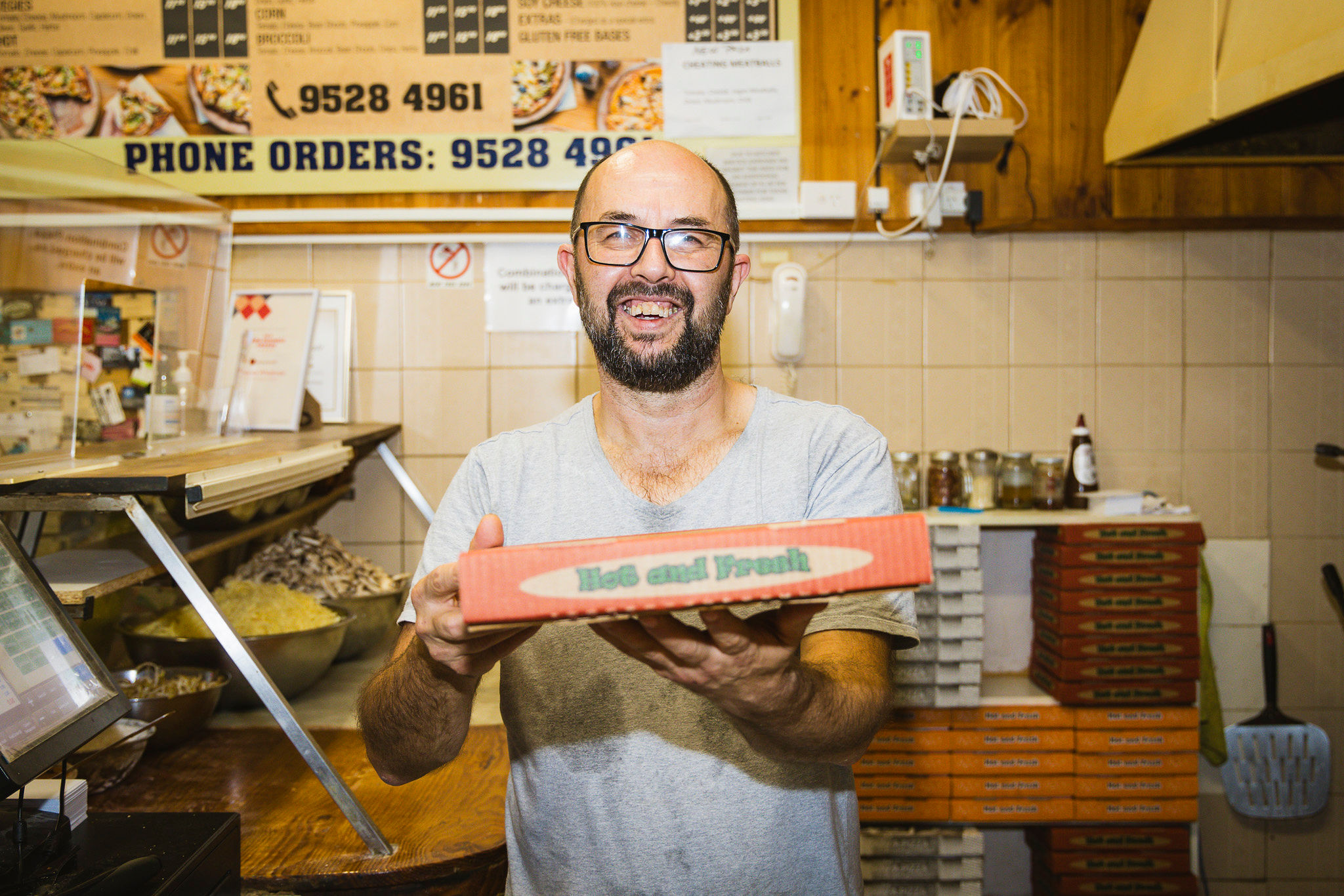Take a peek behind the scenes of some of Glen Eira’s long-running businesses. Get to know the owners and their stories and learn how Glen Eira’s streetscapes have changed over time in our digital exhibition Talking Shops: Glen Eira Stories.
Nostralis Wholemeal Vegetarian & Vegan Pizza
est. before 1981
Address: 55 Hawthorn Road, Caulfield North
From an interview with Tului in 2022 by by Aron Lewin and Tatiana CC Scott from Tales of Brick and Mortar. Interview edited by Aron Lewin. All Photographs © Tatiana CC Scott. Developed for Glen Eira City Council for the Talking Shops project. Tului started working at Nostralis in 1993, but the business predates this.

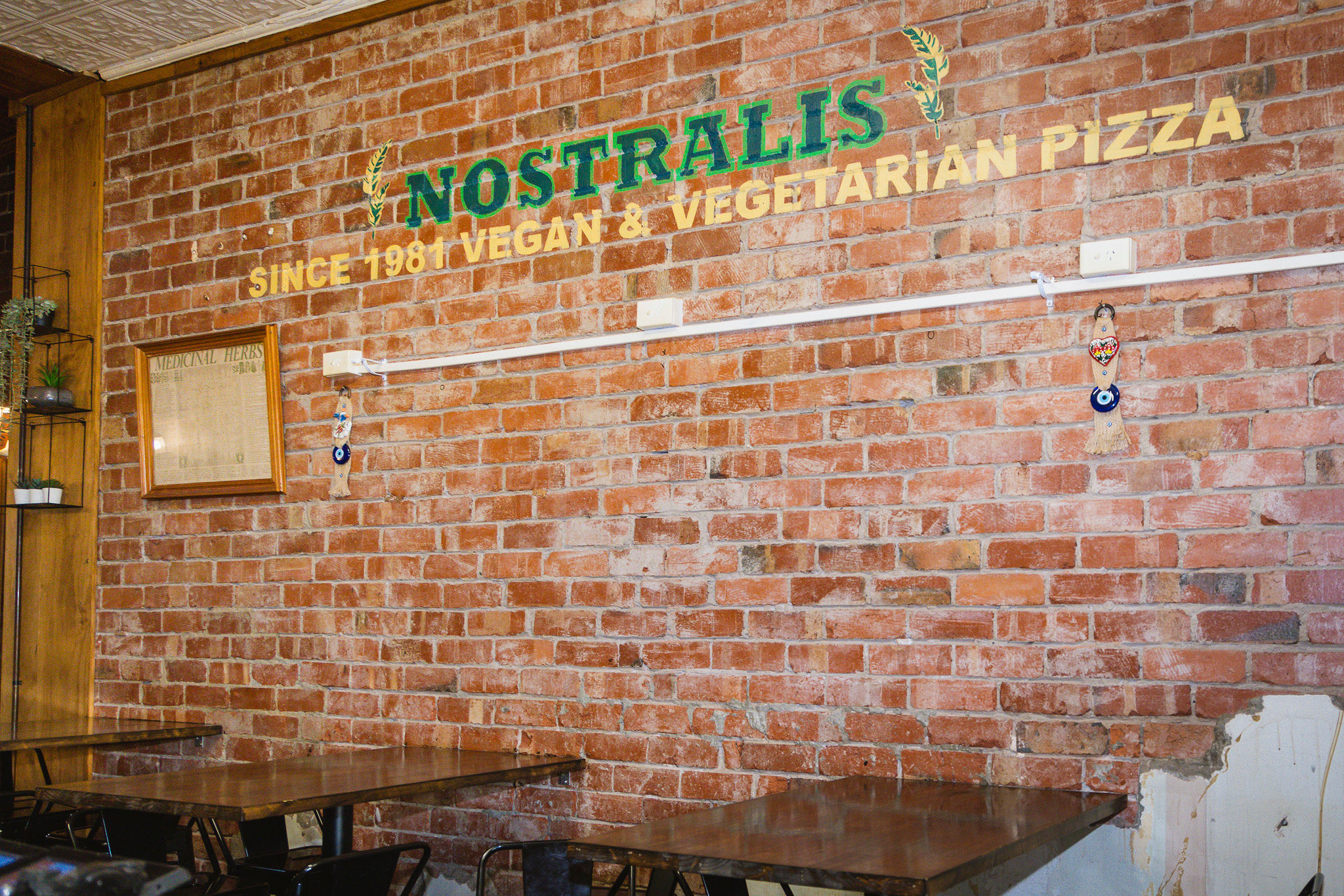
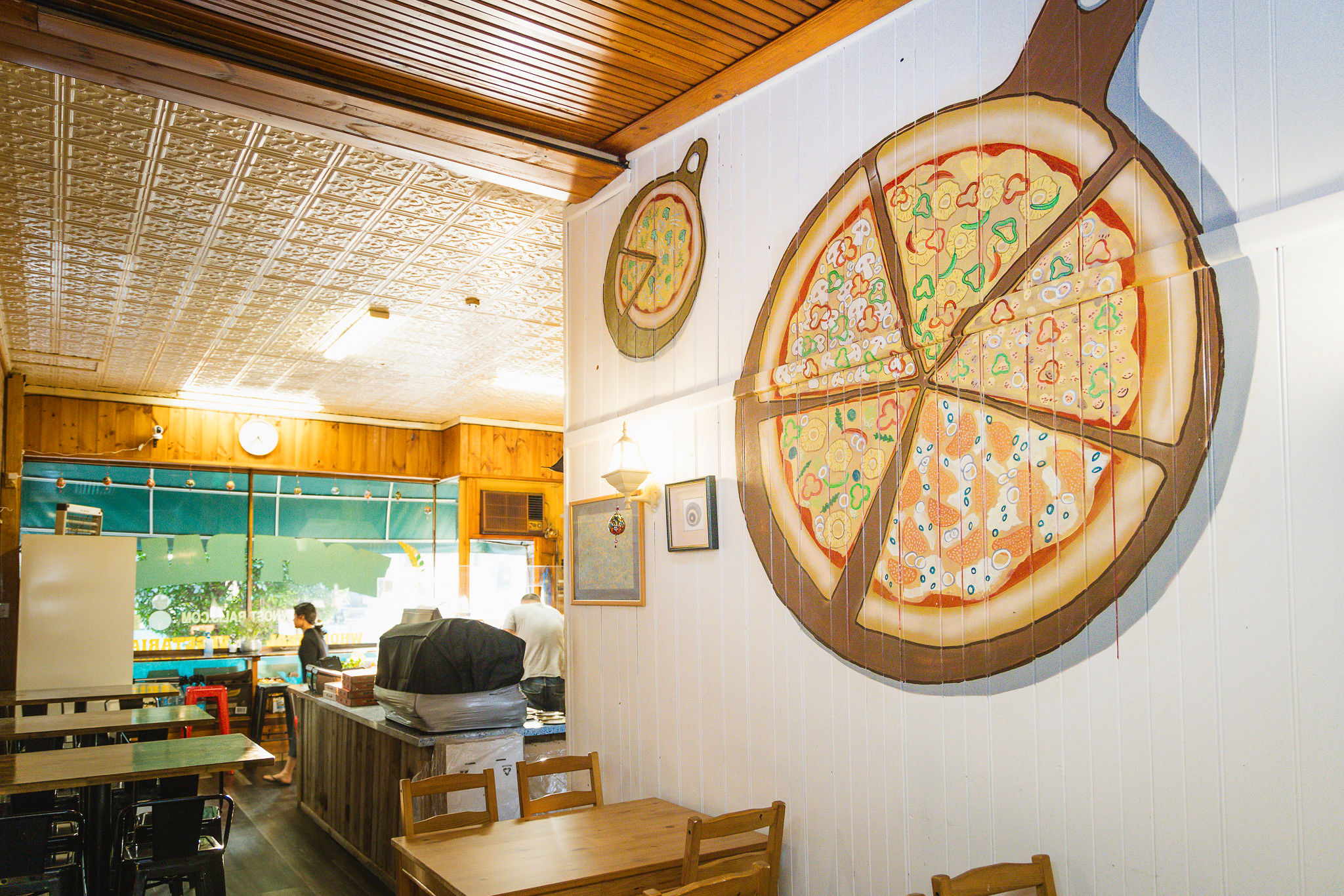

I was born in Switzerland, but when I was one I moved to Turkey with my parents.
I grew up in Istanbul, but my aunt lived in Australia. After my dad passed away in the late 1980s, she said, “come with us to Australia.” I lost my mother years earlier, and there was nothing sticking me to Turkey. So, I said, “okay, I’ll come.” I was around 28 at that time.
When I arrived in 1989, I thought, ‘How can I stay here?’ At that time, if you met an Aussie girl, it was easy. But I wasn’t going to marry someone just to stay in the country. My situation was okay in Turkey too. Just before my visa ended, I went to immigration.
I said, “I want to stay here.”
“If you’ll let me, I’ll stay. But, if you say no, I’ll go back.”
They didn’t extend my visa, but said, “Wait until we give you an answer.” Six months went by, eight months, nearly a year. In the meantime, I met my wife, who’s Turkish, and we married. We had a wedding, rented a house and everything.
It was stressful, because we set up our life here, and I couldn’t work properly.
In the meantime, I was coming to Nostralis, which had been owned by my uncle since 1981.
At that time, I received a letter which said that I had to leave the country in 21 days. I could apply for a visa because I was married, but I had to launch the application out of the country. I went back to Turkey, worked as a medical sales rep and lived with my other aunt there. Again, one month, two months, six months went by. I’d call the embassy and they’d say, “Don’t ring us.” Nearly a year goes by, and I’m almost out of money.
Finally, after over a year and a half, the embassy called me in to do an interview, and asked all these stupid questions. They said, “You’re a crook, you’re cheating us.” I said, “Why?” they said, “You want to stay in the country, that’s why you got married.” I said, “No. I got married after I had applied for the visa,” They didn’t believe me. They rejected the visa.
My wife started to fight from Australia and went to court. Another six or seven months passed. Finally, they said, “All right.”
We can live our life here.
Even though they thought I was lying, I’m married to the same woman thirty years later.
My life really started when I arrived back in Australia in 1993.
I started at Nostralis as a kitchen hand. I had no English. I could say, “Hi, how are you,” to the customer, but I’d pass the phone straight away to my uncle.
I also worked elsewhere: at a milk-bar in Dandenong at first, then at a paper factory, where I worked for 10 years. My uncle, who was co-partner at Nostralis at that time, opened another shop in St Kilda. The partner worked there and my uncle stayed here.
When the partner left, around 1999, my uncle called me and said, “Okay, I need more help. Tell me how much you need as income to survive and pay me whatever is left over.” This was the condition to being a partner. I’d come in all the time, and worked when he was away.
After a while, he wanted to retire and I took over the business. I’ve been the owner since then – over 20 years.
When I look back, it’s gone really fast.
My uncle Sam – who is a strict vegetarian – took over Nostralis in 1981.
He was a pilot in the Jordanian army. He went to Germany to work as a pilot before coming to Australia.
I believe the shop was open before 1981, when he bought it from different owners. He said there were lots of hippies around that time, but they couldn’t sustain it. So, he basically started from zero. There was nothing like vegetarian pizza at that time. On Saturday and Sunday, there would be a queue outside.
There were eight different pizzas on the menu when I came. We created everything together, then – after he left – I created a few more. I added mock-meat pizzas and vegan pizzas with soy cheese. Over the last 10 years, vegan options have started to come on. We’ve also added gluten free pizzas.
Two weeks ago, someone suggested mushroom meatballs, which I tried, and put on the menu.
As far as I know, this was the first vegetarian restaurant in Melbourne.
At first, there weren’t enough vegetarian customers to sustain the business. Then, word spread among people who aren’t vegetarian. People think there’s some secret but there isn’t. If you make the right things, it’s very easy. I use organic wholemeal flour, water, salt, yeast and fresh ingredients. I do everything in front of the customer. That’s all, no secret.
About 50 per cent of our customers aren’t vegetarian, and about 20 per cent of customers are locals. The rest are from everywhere. People travel for it. We have a lot of Indian customers who are vegetarian. We also have a lot of Jewish customers, who know we won’t be mixing milk and meat. If I wanted to eat something nice, I’ll travel across Melbourne too.
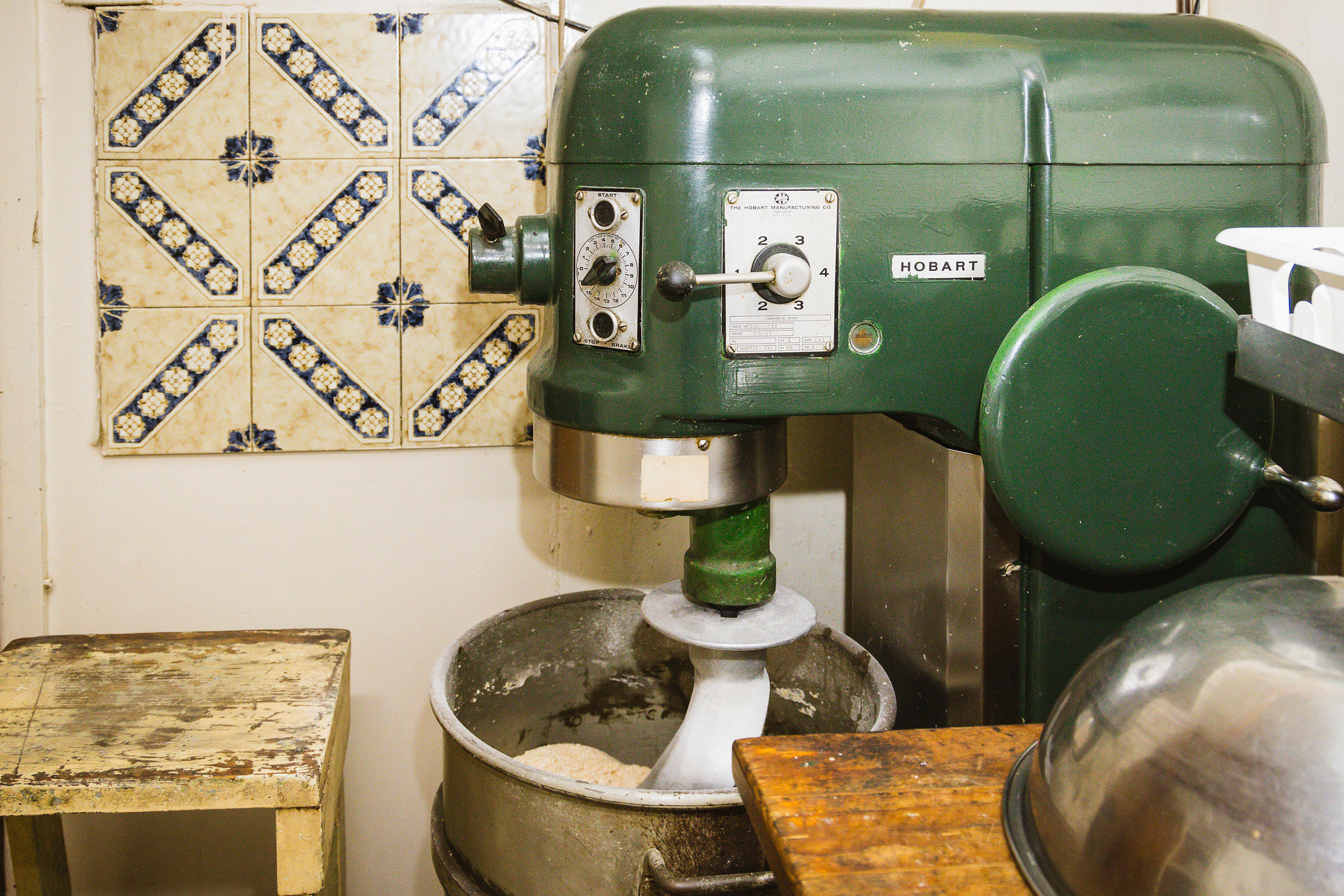
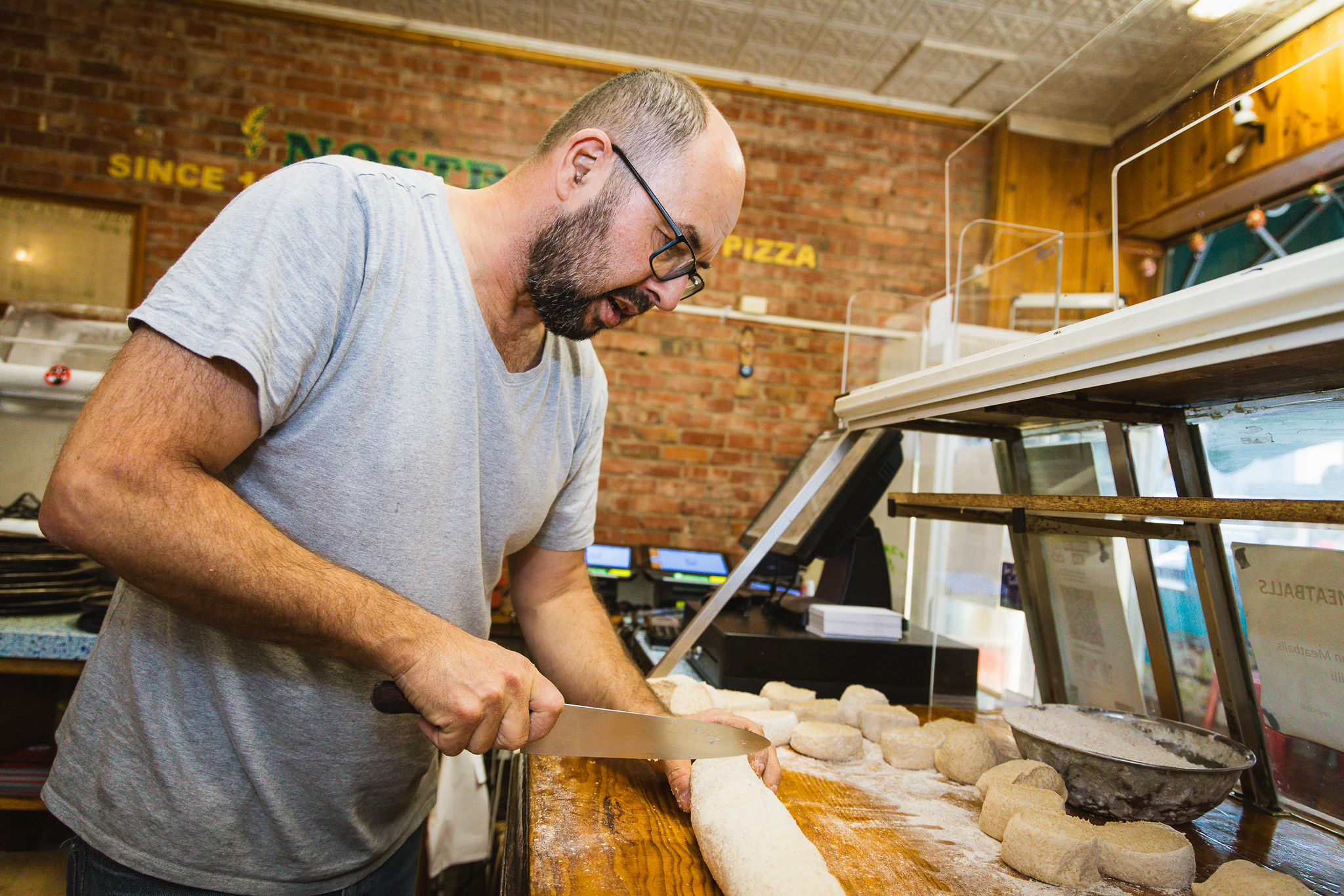

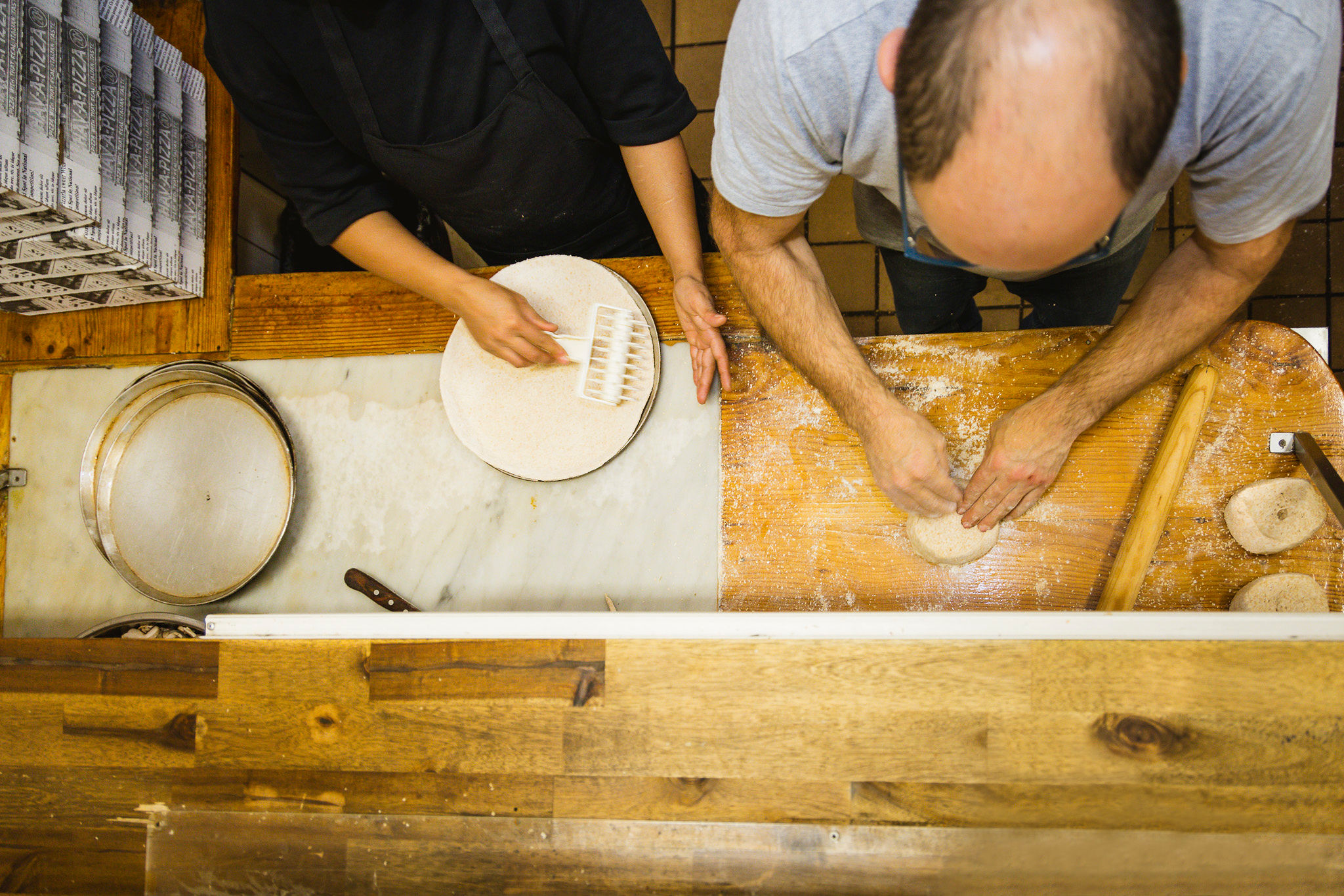
And for some customers, 25-30 years, they’ve never changed their order. The same pizza on the same day each week. I sometimes ask, “Why are you eating the same thing for 25 years?” and they’ll say, “I’m happy, why should I change?”
“I know what I’m eating.”
Sabita and Anusha work with me during the week, and two other staff members work on the weekend.
Sabita has been here 10 years and is getting married. She wants to leave and I don’t want her to go. She’s one that I really trust, because she can do everything well.
In terms of making the pizza, we make everything from scratch. We make the wholemeal bases during the day. The cheese is rennet-free – I believe ours come from artichoke. For the vegan pizza, it’s soy cheese with no animal product. Some customers say they want to make our pizza at home, but it doesn’t work. Our oven is over 300 degrees.
I make pizza in seven minutes here. If you cook it in 15 minutes, you can’t get the same taste, consistency, crispiness and so on. I also know this oven. Every corner cooks differently. If the pizza isn’t cooking in a particular way, I know where to move it. That comes from experience.
Even I don’t cook the same way every time. If the temperature changes, you have to make adjustments.
When you do it and do it and do it, you figure it out over time.
There are customers who lived in the area all their life, and they’ll come and say, “I never knew there was a vegetarian restaurant in the area.”
Customers also say, “Open another one,” but I like being a small shop, as I have more control.
Other pizzerias put things in the freezer, then the next staff member will take it out and use it. It’s not fresh. I have to make it all myself and – if someone comes at the end of the night and makes a request – I’ll make a pizza fresh for them. No deep-freeze.
What I know now, I didn’t know ten years ago. If I were to teach someone everything I know, it would take time.
At my age, I can’t start again and again.
Sometimes I talk to my wife and daughter about the future of the business.
There’s always people who are interested.
But my wife says, “What will you do tomorrow?” I need to do something, and I can’t learn from a new job from scratch.
I also love my customers. They’ll come, not just for the pizzas, but to talk. For years and years, I’ve known them. I’ve seen them grow up, over three generations. They came as kids, now they come with their kids. It makes me happy.
It also suits my lifestyle. I don’t have to wake up really early. I can do my shopping, then come around 4pm. It’s enough time to set up. The only thing for me are weekends. I’m here. You can’t go see friends or go to a party if someone isn’t here.
I also like that I’m on my feet and working with my hands. When I come here, I make pizza, chat with customers and time goes quickly. When you get home tired, and have a shower, you feel like you did something. The everyday connection with customers is good for you.
If you see me here, I’ll be chatting with customers about pizza, politics, anything.
I can talk to 10 customers at the same time, while making pizza.
I became a pescetarian after working here.
When you work here, people start to ask questions like, “Are you vegetarian?” so it was easier to cut meat out. You can’t be a liar, but if I say, “I eat fish,” customers will say, “All right.”
The culture of veganism and vegetarianism has also changed enormously over the years – particularly for me, coming from Turkey. Up until recently, I didn’t know there were vegan products like soya cheese, but it’s changing.
If the veggies are nice, you don’t have to look for meat.
If it’s good, you eat it without worrying.
Over the last couple of years, I didn’t claim any money from the government.
I survived.
I have customers from everywhere, so the five kilometre radius was a bit of a killer for me.
During that period, friendships with locals helped, and I think those interactions were important. If a pizza costs $52, I might say, “Okay, $50.”
It also works the other way.
They’d buy a pizza for $15 and leave $20.
It’s part of that relationship
Now it’s busy again.
I still eat pizza about once a week.
I put what I want on it. It’s wholemeal and healthy.
I still like making pizzas. It’s a good way to spend the day.
You might miss some things from your lifestyle while working at nights or on weekends, but workwise, I’m happy.


